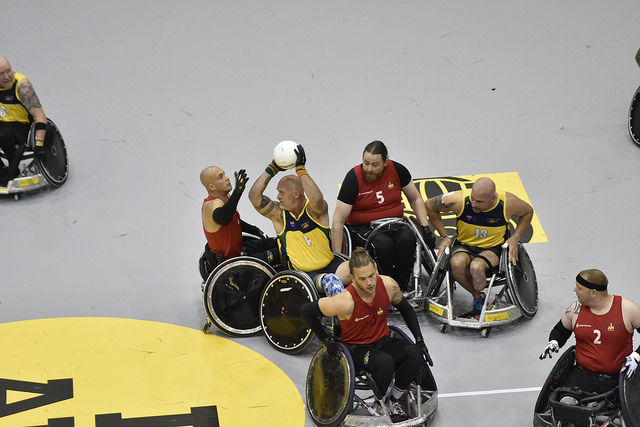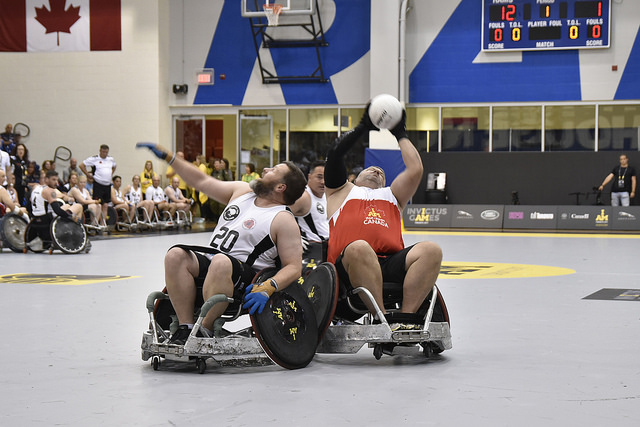Preliminary action in one of the most popular sports at the Invictus Games — wheelchair rugby — got underway Wednesday at the Toronto Pan Am Sports Centre. Crowds cheered on teams from seven nations, plus a last-minute addition — Team Ontario — that was added when France had to pull out from the competition.
All eyes were on the US team, which was hoping to repeat its gold-medal win from Orlando in 2016.
There was a lot of tough competition, however, from other teams hoping to steal the gold from the Americans in this action-packed, fast-paced sport that’s not for the faint of heart. Nicknamed “murder ball” because of the aggressive contact between wheelchairs on the court, the game was invented in Canada in the 1970s and has been a highlight of Invictus Games competition.

Australia takes on Denmark in wheelchair rugby

Canada and New Zealand compete in wheelchair rugby.
Here are some highlights from the first day of action.
Kiwis Make Wheelchair Rugby Debut
New Zealand made their debut in wheelchair rugby at the Invictus Games in a match against Denmark. Fist bumps all around just before the start were as friendly as these teams got, as full-metal contact became the order of the day. The Kiwis showed their grit, never giving up. For the second half, the Kiwis brought out their secret weapons: two female players. Their passing and determination weren’t enough, however, to get New Zealand back in the game, and Denmark took the match 25–11.
Australia and Canada Clash on the Court
You couldn’t hear the wheelchairs hitting each other for the deafening cheers each time Team Canada took possession of the ball in their match against Australia. The Aussies took the game to the Canucks, who failed to cover their own zone adequately against the Australian incursion. Canada stuck to the hockey motto of “short shifts,” getting just about every red-shirted player on the court in the first half. The first half saw the home team at the wrong end of a 16–4 score.
Team Canada tightened up its defense in the second half, bumping anything yellow and green with their hand-operated tanks. The Aussies warily covered Canadian outlet passes, a concerted forechecking effort that made it difficult for the Canucks to reach the offensive zone. Hélène Le Scelleur earned roughneck of the game honours, having been both knocked over by and upending an Aussie in the second half. A last pass to Canada’s Tyron Lincoln for a breakaway final score of the game brought the crowd to its feet in a 28–8 win for Team Australia.
Team USA Takes On “Team Ontario”
The bad news: Team France dropped out of the wheelchair rugby competition.
The good news: Invictus competitors are unconquered, so they put together a new team on the fly — Team Ontario, comprised of competitors all from, aptly, Ontario.
The exciting news: Team Ontario fought defending Invictus Games wheelchair rugby champs Team USA to a 9–9 halftime draw. The two scrappy teams had the crowd maintaining its deafening volume levels in Ryerson’s Mattamy Athletic Centre. With less than a minute to go, Team Ontario pulled ahead 18–16. Team USA clawed and blocked its way to a one-point deficit, but Team Ontario kept the final possession to upset the Americans 18–17.
Valiant Effort by Team Italy
Team UK, fresh off a 19–14 victory over defending champions Team USA, faced off against an injury-depleted Team Italy in the morning’s final match. Per aspera ad astra — through hardship to the stars — is how the Italians explain their will to compete. Several Team Ontario players, fresh off a close victory over Team USA, joined the Italians in their efforts to stop the Brits.
Team UK took a 12–3 lead into halftime. Despite the strong UK fan base, chants of “Let’s go Italy, let’s go!” showed the rest of the spectators’ hearts were with the “Azzurri.” Italy got more creative as the match wore on, trying longer passes, working more effectively with their Team Ontario counterparts, and they cut the lead to 20–11 with just over two minutes to go.
Throughout the second half, the Brits showered their opponents with extra attention, not giving an inch as they continued to slam their chairs with reckless abandon. The Italians gave as good as they got, defending their goal with equal fierceness, denying a score in the dying seconds of the match. In the end, the UK topped Italy 22–12.
USA Takes on Italy
Kicking off the afternoon session on the Coca-Cola court, the Team-Ontario-enhanced Italian team continued their wheelchair rugby adventures against Team USA, with no discernible loss of enthusiasm.
The American team leapt to an early lead, never letting it diminish to less than 10 points. Perhaps stung by two defeats in preliminary play earlier in the day, Team USA clogged the goal mouth with as much determination as if the score were tight. Final score: USA 26, Italy 15.
Denmark and Australia Battle It Out
The afternoon’s second preliminary match featured two teams that both decisively won their encounters earlier in the morning. Even before the match, from the warm-up to the way each player took to the court in formation as their names were announced, Team Denmark and Team Australia were all business.
Both teams opened the second half with fast-break action, spreading the defences, before settling down to defend against long outlet passes and relatively easy scores. The game settled into a more familiar collision-based rhythm, with the exception of weaving, full-court sprints by Danish player Mark Peters, for which the Aussies had no answer. Denmark won the match 25–10.
Invictus Games Hakka Leads New Zealand to Victory
The day’s final match featured Team New Zealand facing off against Team Canada. Both teams struggled during today’s preliminary action. Before the match, Team New Zealand gave Canada a display of defiance with its Hakka written especially for the Invictus Games. Team Canada, as might be expected, sat politely through the yelling, and the Kiwis got a raucous round of applause from the audience in addition to handshakes and fist bumps from their opponents.
New Zealand took an early lead in the first half as Canada got into turnover trouble early and often, unable to clear its own zone for much of the first half. A late-half Team Canada power play resulted in a 4-on-3 and Canada’s second point of the half. New Zealand drew last blood in the half and took a 13–2 lead into halftime. The plot did not change in the second half, though the hometown team continued to work valiantly to put points on the board. Their efforts paid off with a long pass to Hélène Le Scelleur, forcing a Kiwi turnover, and ending the match on an outlet pass score and an interception to prevent a Kiwi marker. New Zealand topped Canada 22–5


